第08天hadjustdonewhen-每日一题之2018快乐暑假高二英语人教版
- 格式:doc
- 大小:520.50 KB
- 文档页数:5
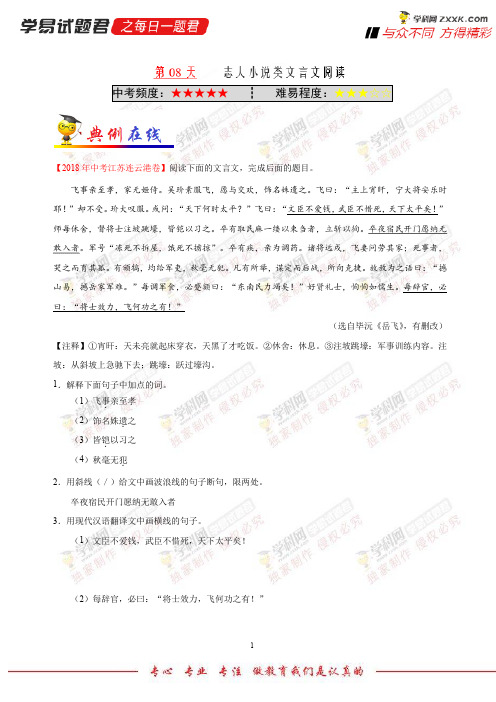
1
中考频度:★★★★★ ┇ 难易程度:★★★☆☆
【2018年中考江苏连云港卷】阅读下面的文言文,完成后面的题目。
飞事亲至孝,家无姬侍。
吴玠素服飞,愿与交欢,饰名姝遗之。
飞曰:“主上宵旰,宁大将安乐时耶!”却不受。
玠大叹服。
或问:“天下何时太平?”飞曰:“文臣不爱钱,武臣不惜死,天下太平矣!”师每休舍,督将士注坡跳壕,皆铠以习之。
卒有取民麻一缕以束刍者,立斩以徇。
卒夜宿民开门愿纳无敢入者。
军号“冻死不拆屋,饿死不掳掠”。
卒有疾,亲为调药。
诸将远戍,飞妻问劳其家;死事者,哭之而育其孤。
有颁犒,均给军吏,秋毫无犯。
凡有所举,谋定而后战,所向克捷。
故敌为之语曰:“撼山易,撼岳家军难。
”每调军食,必蹙额曰:“东南民力竭矣!”好贤礼士,恂恂如儒生。
每辞官,必曰:“将士效力,飞何功之有!”
(选自毕沅《岳飞》,有删改)
【注释】①宵旰:天未亮就起床穿衣,天黑了才吃饭。
②休舍:休息。
③注坡跳壕:军事训练内容。
注坡:从斜坡上急驰下去;跳壕:跃过壕沟。
1.解释下面句子中加点的词。
(1)飞事.
亲至孝 (2)饰名姝遗.
之 (3)皆铠.
以习之 (4
)秋毫无犯.
2.用斜线(/)给文中画波浪线的句子断句,限两处。
卒夜宿民开门愿纳无敢入者
3.用现代汉语翻译文中画横线的句子。
(1)文臣不爱钱,武臣不惜死,天下太平矣!
(2)每辞官,必曰:“将士效力,飞何功之有!”。
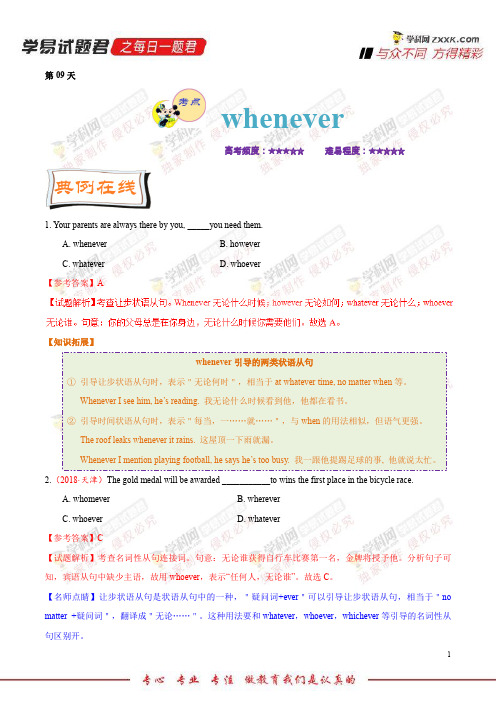
第09天whenever高考频度:★★★☆☆难易程度:★★☆☆☆1. Your parents are always there by you, _____you need them.A. wheneverB. howeverC. whateverD. whoever【参考答案】Awhenever引导的两类状语从句①引导让步状语从句时,表示"无论何时",相当于at whatever time, no matter when等。
Whenever I see him, he’s reading. 我无论什么时候看到他,他都在看书。
②引导时间状语从句时,表示"每当,一……就……",与when的用法相似,但语气更强。
The roof leaks whenever it rains. 这屋顶一下雨就漏。
Whenever I mention playing f ootball, he says he’s too busy. 我一跟他提踢足球的事, 他就说太忙。
2.(2018·天津)The gold medal will be awarded ___________to wins the first place in the bicycle race.A. whomeverB. whereverC. whoeverD. whatever【参考答案】C【试题解析】考查名词性从句连接词。
句意:无论谁获得自行车比赛第一名,金牌将授予他。
分析句子可知,宾语从句中缺少主语,故用whoever,表示“任何人,无论谁”。
故选C。
【名师点睛】让步状语从句是状语从句中的一种,"疑问词+ever"可以引导让步状语从句,相当于"no matter +疑问词",翻译成"无论……"。
这种用法要和whatever,whoever,whichever等引导的名词性从句区别开。
1。
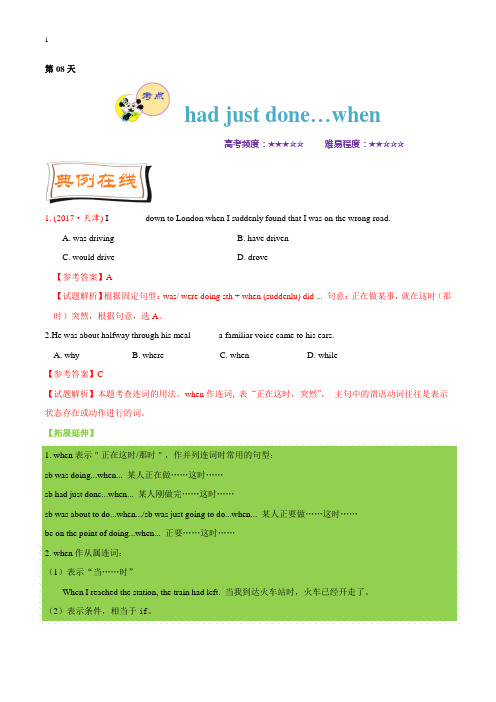
第08天had just done…when高考频度:★★★☆☆难易程度:★★☆☆☆1. (2017·天津) I ________down to London when I suddenly found that I was on the wrong road.A. was drivingB. have drivenC. would driveD. drove【参考答案】A【试题解析】根据固定句型:was/ were doing sth + when (suddenlu) did ... 句意:正在做某事,就在这时(那时)突然,根据句意,选A。
2.He was about halfway through his mealA. whyB. whereC. whenD. while【参考答案】C【试题解析】本题考查连词的用法。
when作连词, 表“正在这时,突然”,主句中的谓语动词往往是表示状态存在或动作进行的词。
【拓展延伸】1. when表示"正在这时/那时",作并列连词时常用的句型:sb was doing...when... 某人正在做……这时……sb had just done...when... 某人刚做完……这时……sb was about to do...when.../sb was just going to do...when... 某人正要做……这时……be on the point of doing...when... 正要……这时……2. when作从属连词:(1)表示“当……时”When I reached the station, the train had left. 当我到达火车站时,火车已经开走了。
(2)表示条件,相当于if。
How can I get a job when I can't even read or write?如果我连读和写都不会,我怎么能找到工作呢?1. Mary ________ through a market when she saw some women selling beautiful scarves. She studied the prices carefully and bought what she needed.A. walkB. was walkingC. had walkedD. has walked2. Peter was so excited _________he met Tom, his primary school classmate, on the first day on the college campus.A. whereB. thatC. whyD. when3. I felt somewhat disappointed and was about to leave _________something occurred which attracted my attention.A. unlessB. untilC. whenD. while4. He was on the point of telling me the secret ___________someone patted him on the shoulder.A.asB. whenC. whileD. then5.I had just stepped out of the bathroom and was busily drying myself with a towel __________I heard the steps.A. whileB. whenC. sinceD. after1.B【解析】句意:Mary正经过一个市场,这时看到一些妇女在卖美丽的围巾。
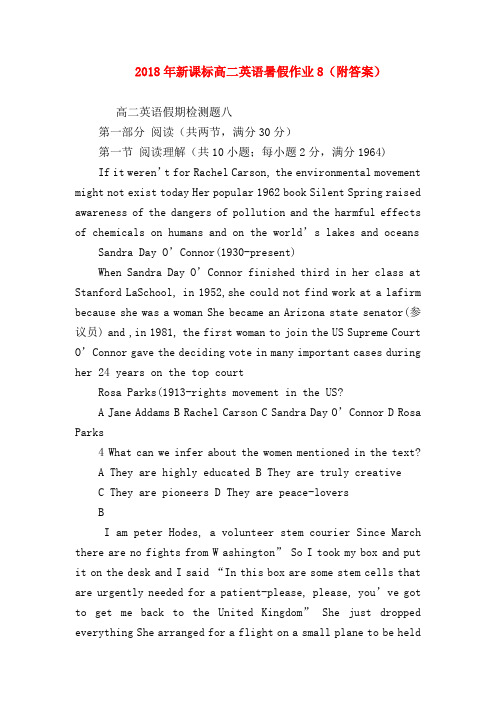
2018年新课标高二英语暑假作业8(附答案)高二英语假期检测题八第一部分阅读(共两节,满分30分)第一节阅读理解(共10小题;每小题2分,满分1964)If it weren’t for Rachel Carson, the environmental movement might not exist today Her popular 1962 book Silent Spring raised awareness of the dangers of pollution and the harmful effects of chemicals on humans and on the world’s lakes and oceans Sandra Day O’Connor(1930-present)When Sandra Day O’Connor finished third in her class at Stanford LaSchool, in 1952,she could not find work at a lafirm because she was a woman She became an Arizona state senator(参议员) and ,in 1981, the first woman to join the US Supreme Court O’Connor gave the deciding vote in many important cases during her 24 years on the top courtRosa Parks(1913-rights movement in the US?A Jane AddamsB Rachel CarsonC Sandra Day O’ConnorD Rosa Parks4 What can we infer about the women mentioned in the text?A They are highly educatedB They are truly creativeC They are pioneersD They are peace-loversBI am peter Hodes, a volunteer stem courier Since March there are no fights from W ashington” So I took my box and put it on the desk and I said “In this box are some stem cells that are urgently needed for a patient-please, please, you’ve got to get me back to the United Kingdom” She just dropped everything She arranged for a flight on a small plane to be held。
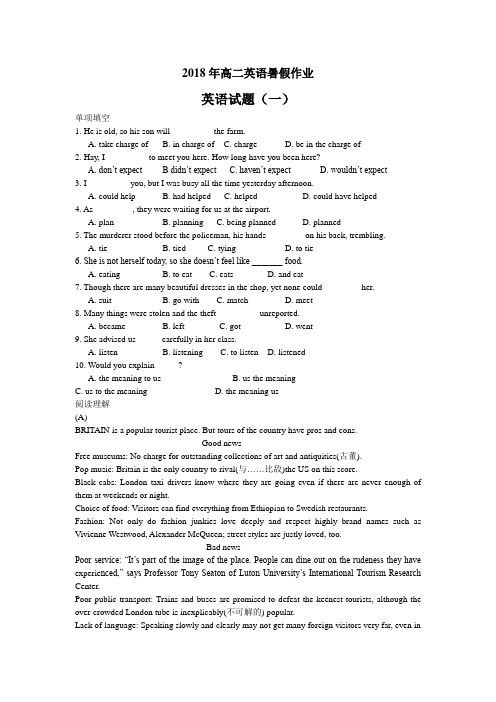
2018年高二英语暑假作业英语试题(一)单项填空1. He is old, so his son will _________ the farm.A. take charge ofB. in charge ofC. chargeD. be in the charge of2. Hay, I _________ to meet you here. How long have you been here?A. don‘t expect B didn‘t expect C. haven‘t expect D. wouldn‘t expect3. I _________ you, but I was busy all the time yesterday afternoon.A. could helpB. had helpedC. helpedD. could have helped4. As ________ , they were waiting for us at the airport.A. planB. planningC. being plannedD. planned5. The murderer stood before the policeman, his hands ________ on his back, trembling.A. tieB. tiedC. tyingD. to tie6. She is not herself today, so she doesn‘t feel like _______ food.A. eatingB. to eatC. eatsD. and eat7. Though there are many beautiful dresses in the shop, yet none could ________ her.A. suitB. go withC. matchD. meet8. Many things were stolen and the theft _________ unreported.A. becameB. leftC. gotD. went9. She advised us _____ carefully in her class.A. listenB. listeningC. to listenD. listened10. Would you explain _____?A. the meaning to usB. us the meaningC. us to the meaningD. the meaning us阅读理解(A)BRITAIN is a popular tourist place. But tours of the country have pros and cons.Good newsFree museums: No charge for outstanding collections of art and antiquities(古董).Pop music: Britain is the only country to rival(与……比敌)the US on this score.Black cabs: London taxi drivers know where they are going even if there are never enough of them at weekends or night.Choice of food: Visitors can find everything from Ethiopian to Swedish restaurants.Fashion: Not only do fashion junkies love deeply and respect highly brand names such as Vivienne Westwood, Alexander McQueen; street styles are justly loved, too.Bad newsPoor service: ―It‘s part of the image of the place. People can dine out on the rudeness they have experie nced,‖ says Professor Tony Seaton of Luton University‘s International Tourism Research Center.Poor public transport: Trains and buses are promised to defeat the keenest tourists, although the over-crowded London tube is inexplicably(不可解的) popular.Lack of language: Speaking slowly and clearly may not get many foreign visitors very far, even inthe tourist traps.Rain: Still in the number one complaint).No air-conditioning: So that even splendidly hot summer become as unbearable as the downpours. Overpriced hotels: The only European country with a higher rate of tax on hotel rooms is Denmark.Licensing hours: Alcohol is in short supply after 11 p.m. even in 24-hour cities.11. What do tourists complain most?A. Poor service.B. Poor public transport.C. Rain.D. Overpriced hotels.12. What do we learn about pop music in Britain and the US through this passage?A. Pop music in Britain is better than that in the US.B. Pop music in Britain is as good as that in the US.C. Pop music in Britain is worse than that in the US.D. Pop music in Britain is quite different from that in the US.13. When is alcohol not able to get?A. At 9:00p.m.B. At 10:00p.mC. At 11:00p.m.D. At 12:00p.m.14. Which of the following is true according to the passage?A. You have to pay to visit the museums.B. It‘s very cheap to travel by taxi there.C. You cannot find Chinese food there.D. The public transport is poor there.(B)Monarch butterflies (黑脉金斑蝶) are a common summer sight in the northern United States and Canada. These large orange and black insects brighten parks and gardens as they fly lightly among the flowers. What makes monarchs particularly interesting is that they migrate all the way to California or Mexico and back. They are thought to be the only insect that does this.Every year in the late summer monarchs begin their journey to the south. Those heading for Mexico go first from the Louisiana-Mississippi area, then fly across the Gulf of Mexico into Texas. Once in Mexico, they settle themselves in one of about fifteen places in a mountain forest filled with fir trees. Each place provides a winter home for millions of monarchs. The butterflies are so many that they often cover entire trees. When spring comes, they begin their long journey north. The question is often asked whether every butterfly makes the round-trip journey every year. And the answer is no. the average monarch lives about nine months. So one flying north might lay eggs in Louisiana and then die. The eggs of that generation may be found in Kentucky;the eggs of next generation may end up in Wisconsin or Michigan. The last generation of the season, about the fourth, will make their way back to Mexico and restart the journey.Scientists learn about monarchs‘ migration by catching and making marks on the insects. By reaching a monarch with such a mark and noticing where it came from, the next scientist can get to know things like the butterfly‘s age and its routing.15. One of the places where monarchs spend the winter is _________.A. the Gulf of MexicoB. an area in MississippiC. a forest in MexicoD. a plain in Texas16. Which of the following is not true?A. Every year in the early summer monarchs begin their journey to the south.B. Not every butterfly makes the round –trip journey every year.C. Monarch butterflies are the only insect that migrates.D. Monarch butterflies begin their long journey north in spring17. The routing of monarchs‘ migration can be learned ________.A. by examining the marks made on themB. by collecting their eggs in the mountainsC. by comparing their different agesD. by counting the dead ones in the forest18. What is the subject discussed in the passage?A. Migration of monarchsB. Scientists‘ interest in monarch s.C. Winter home of monarchsD. Life and death of monarchs英语试题(二)单项填空21. Mary loves history so much that she ______ to study history in university in the future.A. determinesB. enablesC. connectsD. persuades22. Word came that the government hanged the hero. Local residents _________ angrily to it.A. actedB. reactedC. reportedD. adapted23. He often uses ______ ways, which are different from others‘, to solve math problems.A. similarB. practicalC. partialD. particular24. Those problems are _________ difficult for you, so you should think them over.A. hardlyB. separatelyC. extremelyD. generally25. Their old house was too shabby, so they had a new house _________.A. containedB. consistedC. updatedD. built26. He was punished and promised that he _____ not do so again.A. willB. mustC. wouldD. does27. The design __________ children a lot. They all like it.A. contributes toB. appeals toC. falls forD. applies for28. You told me that you had seen the performance _____.A. two daysB. two days beforeC. two days agoD. yesterday29. —The boys are not doing a good job at all, are they?—_____.A. I guess not soB. I don‘t guessC. I don‘t guess soD. I guess not30. — You seem to have lost your way. __________?—Yes. I‘m looking for Jinshan Park.A. What are you looking forB. Are you looking for somethingC. Need any helpD. What are you doing31. He is not very good at getting his ideas _________, so he is easily misunderstood by others.A. overB. alongC. acrossD. about32. They spent all day ________ a model plane and finally completed it.A. getting togetherB. putting togetherC. living togetherD. mixing together33. The school has decided to adopt a different _________ to attract more students, since old ways didn‘t work well.A. useB. approachC. issueD. trick34. The captain ________ all his soldiers before him, telling them to get ready for the fight.A. collectedB. gatheredC. selectedD. elected35. Can you help me to send these letters? Here is the ____ list.A. presentB. mailingC. fileD. phone完形填空An old gentleman bought a new house in the summer near a junior high school. He spent the first few weeks in 36 . Then a new school year began and his surroundings were not as 37 as before. Worse still, every afternoon there were four boys beating on the garbage cans (垃圾桶) 38 in the street. They continued day after day, 39 finally the old man decided it was time to take 40 .One afternoon, he walked out to 41 the boys who were beating the garbage cans down the street. 42 them, he said, ―You kids are a lot of 43 I like to see you 44 your after-school happiness like that. I used to do the 45 thing when I was your age. Will you do me a favor? I‘ll give you each a dollar if you 46 to come around every day and do this.‖Of course, the kids accepted the 47 gladly and went on beating their “drums”48 . A few days later, the old man came up to them again as they 49 their way down the street. He said, “I haven’t 50 my pension (退休金) yet, so I’m going to give you all 51 25 cents. Will that be OK?‖“Only 25 cents?‖ A boy52 . ―Do you think we will 53 our time beating these cans around just for one 54 ? We‘re not that 55 ! Bye, sir!‖ Then the old gentleman enjoyed peace again for the rest of his days.36. A. trouble B. safety C. peace D. loneliness37. A. beautiful B. clean C. noisy D. quiet38. A. clearly B. happily C. quickly D. sadly39. A. before B. though C. until D. since40. A. action B. notice C. medicine D. control41. A. welcome B. scare C. beg D. meet42. A. Inviting B. Stopping C. Facing D. Recognizing43. A. fun B. madness C. courage D. freedom44. A. feel B. express C. destroy D. create45. A. good B. terrible C. same D. helpful46. A. start B. stop C. pretend D. promise47. A. offer B. plan C. idea D. chance48. A. as usual B. no longer C. at times D. once more49. A. lost B. push C. drummed D. went50. A. counted B. brought C. considered D. received51. A. less than B. no more than C. almost D. altogether52. A. cried out B. gave in C. broke in D. ran away53. A. spend B. waste C. leave D. use54. A. cent B. half C. quarterD. dollar55. A. kind B. selfish C. stupid D. clever英语试题(三)一.词组翻译1. 赢得这次旅行的一个名额感到很幸运2. 作为……很出名3. 某人被活埋4.被任命为总指挥5. 埋在沙子下面的建筑物遗址6. 我是加拿大的代表7. 古代文明8. 接管9. 一副双筒望远镜10. 对…造成损坏二.单词拼写1. Many famous buildings such as the Great Wall and the Summer Place can represent the ancient c______ of China.2. The garden that was once so beautiful was d________ in the flood.3. Since the law of wildlife protection came into effect, the number of the milu deer has grown g_______ year by year.4.Manhattan is well known as the c____________ centre of America.5. He grew up in a w___________ family, so he knows nothing about the life of the poor. 6.Many American p____________ served in Congress before they have the highest political position.7. The __________(残留物) of lunch were still on the table.8. _______(不幸地), Karen got seriously injured in a car accident on her way home.9. It was reported that a volcano e______ in central America.10. Due to the destruction of plants, we suffer s______ in the north every spring.11. the professor is preparing a l_______ on the Chinese culture.12. The old temple temple was turn into r______ in the fire.13. The library holds some important d______ about the Qing Dynasty.14. We‘re making efforts to make China a powerful and w_______ country in the world.15. During the festivals, the c______ centers are crowded with people.英语试题(四)一:单项选择()1. The teacher, with 6 girls and 8 boys of her class, ______ visiting a museum when the earthquake struck.A. wasB. wereC. had beenD. would be()2. Peter will ______ as managing director when Bill retires.A. take upB. take inC. take offD. take over()3. Many people are still buried ____ after the earthquake.A. livingB. aliveC. livelyD. live()4. Nobody can _____ us _____ getting married. Which of the following is wrong?A. protect; fromB. prevent; fromC. forbid; /D. keep; from()5. The house was completely ______ by fire.A. damagedB. destroyedC. causedD. beaten()6.______ for him, the police had been informed and were waiting outside.A. HappilyB. UnfortunatelyC. FortunatelyD. Waiting()7. I don‘t think there _____ some problems with his body.A. beB. used to beingC. existD. is()8. Mr. Brown is a world-famous professor who is ____ in experience.A. wealthyB. richC. well offD. wealth()9. The evidence was gradually covered ____ by the heavy snow that night.A. withB. inC. overD. up()10. The lady ______ herself Mary was the hostess of this party.A. calledB. who was calledC. callingD. was called()11.A society arranged ______ several students _____ an expedition.A. by; to go onB. for; go onC. by; going onD. for; to go on()12.I find the _____ of buildings _____ under the sand.A. remaining; buriedB. remainders, buryC. remains; buriedD. remains, burying二、单词拼写:1. Things ____________(逐渐) improved.2. It‘s good to get back to ____________(文明) after living in a tent in the remote area for two weeks.3. It‘s many years since Mount Vesuvius last _________(爆发).4.___________(不幸的是), we arrived too late to catch the place.5. I work for a __________(商业的) radio station.6. The policeman let me off with a l_________ about speeding.7. He was very attentive with his head b_________ in a newspaper.8. Chen Kaige is one of the famous d________ in China.9. The terrible fire d_________ most of the buildings within 20 minutes.10. Building m_________ are very expensive nowadays.三:按照要求翻译句子1. 能够代表我们班全体同学在这里讲话,我感到非常幸运。
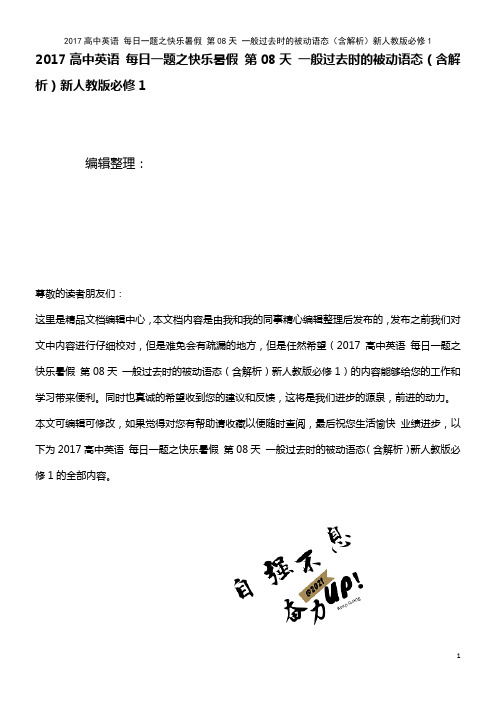
2017高中英语每日一题之快乐暑假第08天一般过去时的被动语态(含解析)新人教版必修1编辑整理:尊敬的读者朋友们:这里是精品文档编辑中心,本文档内容是由我和我的同事精心编辑整理后发布的,发布之前我们对文中内容进行仔细校对,但是难免会有疏漏的地方,但是任然希望(2017高中英语每日一题之快乐暑假第08天一般过去时的被动语态(含解析)新人教版必修1)的内容能够给您的工作和学习带来便利。
同时也真诚的希望收到您的建议和反馈,这将是我们进步的源泉,前进的动力。
本文可编辑可修改,如果觉得对您有帮助请收藏以便随时查阅,最后祝您生活愉快业绩进步,以下为2017高中英语每日一题之快乐暑假第08天一般过去时的被动语态(含解析)新人教版必修1的全部内容。
第08天一般过去时的被动语态重要程度:★★★★★难易程度:★★★★☆(2017·北京) In the 1950s in the USA, most families had just one phone at home, and wireless phones _______ yet。
A。
haven’t invented B。
haven't been inventedC. hadn’t invented D。
hadn’t been invented【参考答案】D【拓展延伸】一般过去时的被动语态1。
一般过去时的被动语态的构成:was/were + 及物动词的过去分词。
2. 句式变化:肯定句:主语 + was/were + 及物动词的过去分词 + 其他。
否定句:主语 + wasn’t/weren't + 及物动词的过去分词 + 其他。
一般疑问句:Was/Were + 主语 + 及物动词的过去分词 + 其他?回答:Yes, 主语 + was/were.No, 主语 + wasn’t/weren’t.【规律总结】一、被动语态主要在下面几种情况中使用:1. 不知道或没有必要说明动作的执行者是谁时。
2018年新课标高二英语暑假作业-范文模板本文部分内容来自网络整理,本司不为其真实性负责,如有异议或侵权请及时联系,本司将立即删除!== 本文为word格式,下载后可方便编辑和修改! ==新课标高二英语暑假作业1.用abandon,desert的适当形式填空(1)They their sinking ship.(2)Mike just his girlfriend when he met his managers daughter.(3)The scientist his research for lack of fund.2.用preserve,protect或defend的适当形式填空(1)He was anxious to his reputation.(2)In summer,we should try to our skin from the sun.the border against possible attacks.(4)Kids should be from all that violence.3.用occur,happen或take place的适当形式填空(1)Great changes have in China since the 1980s.(2)It suddenly to me that we could ask our friends to help us.(3)So far Tom hasnt showed up;what has to him?(4)At that moment,a good idea to me.4.用gather,collect的适当形式填空(1)A lot of people in the street.(2)We a lot of money for the Hope Project.(3)A crowd to watch the fight.。
第08天had just done …when高考频度:★★★☆☆难易程度:★★☆☆☆1. (2018·天津) I ________down to London when I suddenly found that I was on thewrong road.A. was drivingB. have drivenC. would driveD. drove 【参考答案】A【试题解析】根据固定句型:was/ were doing sth + when (suddenlu) did ... 句意:正在做某事,就在这时(那时)突然,根据句意,故选A 。
2. Mary ________ through a market when she saw some women selling beautiful scarves.She studied the pricescarefully and bought what she needed.A. walkB. was walkingC. had walkedD. has walked【参考答案】B【试题解析】句意:Mary 正经过一个市场,这时看到一些妇女在卖美丽的围巾。
她认真比较了价格,然后买了她需要的。
“when she saw some women selling beautiful scarves ”表示了过去某个时间正在发生的动作。
故选B 。
【拓展延伸】1. when 表示"正在这时/那时",作并列连词时常用的句型:sb was doing...when... 某人正在做……这时……sb had just done...when... 某人刚做完……这时……sb was about to do...when.../sb was just going to do...when... 某人正要做……这时……be on the point of doing...when... 正要……这时……2. when作从属连词:(1)表示“当……时”zx.x.kWhen I reached the station, the train had left. 当我到达火车站时,火车已经开走了。
第五部分:高考重点词汇词性变化答案Asection 11. abandon —abandoned (adj.)2. able —ability (n.)—unable (不能够adj.)—enable (v.)3. absent—absence(n.)4. absolute—absolutely(adv.)5. accept—acceptable (adj.)—acceptance(n.)4. access —accessible( adj. )5. accident—accidental(adj.) —accidentally(adv.)6. achieve—achievement(n.)7. act--action (n.)—active(adj.) —actor—actress8. active —activity (n.) —actively (adv.)9. actual—actually (adv.)10.addict—addicted(adj.)—addiction (n.)11.addition—additional(adj.)—additionally(adv.)12. adjust —adjustment(n.)13.admire—admirable (adj.)—admiration (n.)14.admit—admitted(pt)—admitted(pp)—admission (n.)15. adopt —adopted(adj.)16. advance—advanced(adj.)17. advertise —advertisement (n.)18. affect —effect (n.)19. afford —affordable(adj. )20. Africa —African (adj.)21. age —aged(adj.)—aging (adj. )22. agree—agreement (n.)23. agriculture—agricultural (adj.)24. adventure—adventurous(adj. )25. amaze—amazement(n.) —amazing (adj. ) —amazed (adj.)26. ambition—ambitious(adj.)27.amuse—amusement(n.)—amusing (adj.)—amused(adj.)28. angry—anger(n.)—angrily(adv.)29.announce—announcement—announcer 30.annoy—annoyed—annoyed(pt/pp)—annoying (-ing.)31. annual—annually( adv.)32. anxious—anxiety(n.)—anxiously(adv.)33. apology —apologize (v.)34. appeal—appealing (adj.)35. appear—appearance(n.)section 236. apply—applied-applied (pt./pp.) —applying (-ing.)37.apply —applicant(n.)—application(n.)38.appoint—appointment (n.)—appointed(adj.)39. appreciate —appreciation(n.)40. argue—argument(n.)—arguing (-ing.)41. arise—arose (pt.)—arisen (pp.)42. arrange—arrangement (n.)43. arrive—arrival(n.)44. assist—assistance (n.)—assistant(n.)45.astonish—astonishment(n.)--astonishing (adj.)—astonished(adj.)46. athlete—athletic(adj.)47. attempt —attempted (adj. )48. attentive —attentively(adv.)49. attract—attractive(adj.)—attraction (n.)B1.bad—worse—worst—badly(adv.)2.balance—balanced(adj.)3.ban—banned(pt)—banned(pp)4.basic—basically(adv.)5.bath—bathe (v.)6.beat—beat (pt)—beaten (pp)7.beautiful—beauty(n.)—beautify(v.)8.become—became(pt)—become(pp)9.beg—begged(pt)—begged(pp) —begging(v-ing)10.begin—began(pt)—begun(pp)—beginner(n.)—beginning(n.)11.behave—behavior(n.)12.believe—belief (n.)—believable (adj.)13.belong—belongings ( n.)14.bend—bent (pt) —bent (pp)15.benefit—beneficial (adj.)16.betray—betrayed (pt)—betrayed (pp)section 317.bite—bit(pt)—bitten (pp) —biting (v-ing)18.bleed—bled(pt)—bled (pp)19.blood—bloody(adj.)20.blow—blew(pt)—blown (pp)21.bookshelf—bookshelves(pl.)22.branch—branches(pl.)23.brave—bravery( n.)—bravely (adv)24.break—broke (pt)—broken (pp)25.breath—breathe (v.)—breathless26.brief—briefly (adv.)27.bring—brought(pt)—brought (pp)28.build—built(pt)—built (pp)29.burn—burned/burnt (pt)—burned/burnt (pp)30.burst—burst (pt)—burst (pp)31.buy—bought (pt)—bought (pp)32.broad—broaden (v.)33.busy—businessman(n.)—busily (adv.)C1. care(v./n.)—careful(adj.)—carefully (adv.)—careless(adj.)—carelessness(n)2. cast—cast(pt)—cast (pp)3. catch—caught(pt)—caught (pp)4. celebrate—celebration ( n.)5. center—central(adj.)6. challenge—challenging (adj.)7.change—changeable (adj.)section 48.charm—charming (adj.)9.chat—chatted(pt)—chatted(pp)—chatting (v-ing)10.cheer—cheerful (adj.)—cheerfully (adv.)11.chemistry—chemist(n.)—chemical (adj.; n.)12.child—children (pl.)13.choose —chose(pt)—chosen (pp)—choice(n.)14.clap—clapped(pt)—clapped(pp)15.collect—collection(n.)fort—comfortable(adj.)—comfortably(adv.)e—came(pt)—come(pp)—comingmunicate—communication (n.)pete—competition (n.)—competitive(adj.)—competitor(n.)plain—complaint (n.)plete—completely(adv.)22.concentrate—concentration(n.)23.concern—concerned(adj.)—concerning(prep)24.conclude—conclusion(n)25.confidence—confident(adj.)—confidently(adv.)26.confuse—confused(adj.)—confusing(adj.)—confusion(n.) section 527.congratulate—congratulation(n.)28.connect—connected (adj.)—connection (n.)29.consider—consideration(n.)—considering(prep/conj)—(adj.)30.constant—constantly(adv.)31.construct—construction(n.)32.contribute—contribution(n.)33.control—controlled (pp)—controlled(pt)34.convenient--inconvenient(adj.)—convenience(n.)35.correct—correctly(adv.)—correction(n.)36.cost—cost(pt)—cost(pp)—costly(adj.)37.crazy—crazily (adv.)38.create—creation (n)—creative(adj.)39.color—colorful(adj).40.crowd(v./n.)—crowded(adj.)41.cruel—cruelly(adv.)—cruelly(n.)42.culture—cultural(adj.)43.curious—curiously(adv)—curiosity(n.)44.cut—cut(pt)—cut(pp)—cutting (-ing)D1.danger—dangerous (adj.)2.dark—darkness (n.)3.decide—decision (n.)4.deep—depth(n.)—deepen (v.)5.die—death(n.)—dead(adj.)—dying(adj.)6. deal—dealt(pt)—dealt (pp)7.decorate—decoration (n)8. definite—definitely (adv.)9. delay—delayed (pt.)—delayed (pp.)10. deliberate—deliberately (adv.)11.delight (n./v. )—delighted (adj. )12. deliver —delivery (n.)13.demand(vt./n.) —demanding (adj.)14. depend—dependence(n.)—dependent(adj.)15. independent—independence(n.)16. depress—depressed(adj.)—depressing(adj.)—depression(n.)17. describe—description (n.)18. desert —deserted (adj.)19. design—designer(n.)20.destroy—destroyed(pp)—destroyed(pt)21.defend—defense(n.)22.determine—determined(adj.)—determination(n.)23.develop—development(n.)—developed/developing(adj.)24.devote—devoted(adj.)—devotion (n.)25.dirt—dirty (adj.)26. divide—division (n.)27.differ—different(adj)—difference(n)28.difficult—difficulty(n.)29.disagree—disagreement(n.)30.disappoint—disappointed(adj.)—disappointing (adj.)—disappointment (n.)31.discourage—discouraged(adj.)—discouragement(n.)32.discover—discovery(n.) —discoverer(人)33.discuss—discussion(n.)34. dig—dug(pt)—dug(pp)35. distinguish—distinguished(adj.)36.donate—donation(n)37. doubt—undoubtedly (adv.)section 638. draw—drew(pt)—drawn (pp)39. drive—drove(pt)—driven (pp)40. drink—drank(pt)—drunk (pp)41. dust—dusty(adj.)E1. eager—eagerly(adv.)2. early —earlier (比较级)—earliest(最高级)3. east—-eastern (adj.)4. eat—ate(pp.)—eaten (pt.)5. edit—editor(n.)—edition(n.)cate—education (n.)—educator(n.)—educated(adj.)7.effect —effective (adj.)—affect(v.)8.elect—election(n.)9.electricity—electric(adj.)—electrical(adj.)10.embarrass—embarrassing(adj.)—embarrassed(adj.)—embarrassment(n.)11.employ—employment(n.)—employer(n.)—employee (n.)—employed (adj.)—unemployment(n.)12.encourage—encouragement(n.)—encouraging(adj.)—encouraged(adj.)—discourage (v.)—discouraged(adj.)—courage(n.)13.endanger—endangered (adj.)14.end—endless(adj.)15.energy—energetic (adj.)16.enjoy—enjoyable(adj.)—enjoyment(n.)rge—enlarge (v.)18.rich —enrich(v.)19. enter—entrance (n.)20.enthusiasm—enthusiastic(adj.)21.environment—environmental (adj.)—environmentally (adv.)22.equal—equality(n.)—equally(adv.)23.equip—equipment(n.)—equipped (pt.pp.)24.Europe—European (adj.)25.examine—examination(n.)26.excite—exciting(adj.)—excited(adj.)—excitement(n.)27. exhaust—exhausted (adj.)—exhausting(adj.)28.exhibit—exhibition (n.)29.exist—existence(n.)30.expect—expectation (n.)31.expense—expensive(adj.)32.experience—experienced(adj.)33. explain —explanation (n.)34.express—expression(n.)35.extreme —extremely (adv.)F1.face—facial (adj.)2.fail—failure(n.)3.fair—fairly(adv.)—unfair(adj.)4.faith—faithful(adj.)5.fall—fell(pt.)—fallen(pp.)6.feel—felt(pt.)—felt(pp.)7. familiar—unfamiliar(adj.)8.fame—famous(adj.)9.far—farther/further(比较级)—farthest/furthest(最高级)10. fascinate—fascinating(adj.)11.fashion—fashionable(adj.)12.fast—faster(比较级)—fastest(最高级)13.favor—favorable(adj.)—favorite(adj.)14.fear—fearful(adj.)—fearless(adj.)section 715.feed—fed(pt.)—fed(pp.)16.few—fewer(比较级)—fewest(最高级)17.fierce—fiercely(adv.)18.fight —fought(pt.)—fought(pp.)19.find—found(pt.)—found (pp.)20.found—founded(pt.)—founded(pp.)21.fix—fixed(adj.)22.flee-fled(pt.)—fled(pp.)23.fly—flew(pt.)—flown(pp.)24.flow—flowed(pt.)—flowed(pp.)25.fluent—fluency(n.) —fluently (adv.)26.frequent—frequency(n.)—frequently(adv.)27.fog—foggy(adj.)28.follow—following (adj.)29.as follows31.fool—foolish(adj.) —foolishly(adv.)32.on foot33.foot—feet(pl.)34.forbid—forbade(pt.)—forbidden (pp.)35. foreign(adj.)—foreigner(adj.)36.forget—forgot (pp.)—forgotten (pt.)—forgetting (v-ing.)—forgetful (adj.)—unforgettable(adj.)37.forgive—forgave(pt.)—forgiven(pp.)38.fortune—fortunate(adj.)—fortunately (adv.)—unfortunately(adv.)39.freeze—freezing (adj.)—frozen(adj.)—froze(pt.)—frozen(pp.)40.make friends with41.friend—friendly (adj.)—friendship(n.)42.fright—frighten(v.)—frightening(adj.)—frightened(adj.)43.be filled with be full of44. fulfill—fulfilling (adj.)45.full—fully(adv.)46.final—finally(adv.)47. four—fourth—fourteen—forty48. fold—folding (adj.)—unfold (v.)G1.garden—gardener(n.)—gardening(n.)2.gather—gathering (n.)3.generous (adj.)—generosity(n.)4.gentle—gently(adv.)5.get—got(pt.)—got/gotten(pp.)6.gift—gifted (adj.)7.give—gave(pt.)—given(pp.)8.globe—global(adj.)—globally (adv.)9.go—went(pt.)—gone(pp.)ern —government( n.) —governor (n.)11.gradually12.graduate —graduation (n.)—graduate (n.)13.grammarsection 814.great—greatly (adv.)15.greet with sb.—greetings16.grow—grew(pp.)—grown(pt.)—growth17.guide—guide (n.)—guidance (n.)18.guilt—guilty(adj.)H1. handkerchief—handkerchiefs/handkerchieves2. hang—hanged(pt.)—hanged(pp.)—hung(pt.)—hung(pp.)3. happy—happily (adv.)—happiness(n.)4. work hard5. hardly6. harm—harmful (adj.)—harmless(adj.)7. harvest8. health—healthy(adj.)9. hear—heard(pt.)—heard(pp.)10. heat—heated(adj.)11. help—helpful (adj.)—helpless(adj.)12. hero—heroes (pl.)13. hesitate(v.)—hesitation(n.)14. hide—hid(pt.)—hidden(pp.)15. hit—hit (pt.)—hit (pp.)16. hold—held (pt.)—held (pp.)section 917. honest—honestly(adv.)—honestly (n.)18. feel honored to do19. hope—hopeful(adj.)—hopefully (adv.)—hopeless(adj.)20. horror—horrible (adj.)—horribly (adv.)21. housewife—housewives (pl.)22. humor—humorous (adj.)23. hunger—hungry24. hunt—hunter (n.)25. hurry(v./n.)—hurriedly (adv.)26. hurt—hurt (pt./pp.)I1. identify (v.)—identity (n.)2. ill--illness(n.)3. imagine—imagination (n.)4. immediately (adv.)5. important—importantly (adv.)—importance (n.)6. possible—possibly(adv.)—impossible(反)—possibility (n.)7. impress(v.)—impression (n.)—impressive(adj.)8. improve —improvement (n.)9. inch—inches (pl.)10. increase—increasingly (adv.)11. independent (n.)—independence(n.)12. indicate(v.)—indication (n.)13. industry—industrial (adj.)14. inform—information (n.) keep sb. informed of sth.15. injure—injured (adj.)—injury(n.)—injures16. innocent (adj.)—innocence(n.)17. inspect—inspection(n.)18. inspire—inspiring (adj.)—inspired(adj.)—inspiration(n.)19. instruct (v.)—instruction—instructed(adj.)20. intelligent (adj.)—intelligence (n.)21. intend—intention (n.)22. interest—interesting (adj.)—interested(adj.)23. international24. interrupt —interruption (n.)25. introduce—introduction (n.)26. invent—invention(n.)—inventor(n.)27. invite—invitation (n.)J1.job—jobless(adj.)2.jog—jogging (n.)3.journalist—journalism4.to one’s joy5.judge(v.)—judgment (n.)—judge (n.)—judging fromK1.keep—kept(pt.)—kept (pp.)2.key—keys (pl.)3.kind—kindness(n.)—kindly (adv.)4.knife—knives (pl.)5.know—knew (pt.)—known (pp.)Lrge—enlarge (v.)—largely (adv.)tetertesttely6.the former...the latter7.have a good laugh —burst into laughter—burst out laughingck—lacking (adj.)st--lasting (adj.)w—lawyer (n.)y—laid (pt.)—laid(pp.)zy—laziness (n.)—lazily (adv)13.lead—led(pt.)—led(pp.)14.leading15.leaf—leaves (pl.)section 1016.learn—learned/learnt(pt.)—learned/learnt (pp.)17.learned18.little—less(比较级)—least(最高级)19.leave—left(pt.)—left(pp.)20.lend—lent (pt.)—lent(pp.)21.long—length (n.)22.let—let(pt.)—let(pp.)—letting(v-ing. )23.legal—illegal24.liberate—liberation (n.)25.librarian26.lie —lied(pt.)—lied(pp.) —lay(pt.)—lain(pp.)27.life—lives(pl.)28.light —lighter (比较级)29.likely —more likely (比较级)30.limit—limited (adj.)31.locate—location (n.)32.literature(n.)—literary(adj.)33.lose—loss( n.)—lost(adj.)—lost (pt.)—lost(pp.)34.loyal—loyalty (n.)35.low—lower(v.)36.luck —lucky (adj)—luckily (adv.)—unlucky(adj.)—unluckily (adv.)M1. major—majority (n.)2. manage—manager(n.)—management (n.)3. marry—married (pt.)—married(pp.)—marriage(n.)4. mean —meant(pt.)—meant(pp.)5. meaning—meaningful (adj.)—meaningless(adj.)6. measure —measurement (n.)7. medicine—medical (adj.)8. meet —met(pt.)—met (pp.)—meeting(n.)9. mental—mentally (adv.)10. mercy —merciful (adj.)11.mess—messy(adj.)12. mistake—mistaken(adj.)—mistook(pt.)—mistaken(pp.)13.misunderstand—misunderstood(pt.)—misunderstood(pp.)14. mix—mixture (n.)15. moral—morally (adv.)section 1116. mountain —mountainous (adj.)17.move—movement(n.)—moving(adj.)—moved18. music—musical (adj.)—musician(n.)19. mouth—mouths (pl.)20. murder—murderer (n.)N1.narrow—narrowly (adv.)2.nation—national (adj.)—nationality (n.)3.nature—natural (adj.)—naturally (adv.)4.necessary—unnecessary—necessity ( n.)5.nervous—nervously (adv.)6.nice—nicely (adv.)7.noise—noisy (adj.) —nosily (adv.)8.normal —normally (adv.)—abnormal9.north —northern (adj.)10.nine—ninth—nineteen—ninetiethO1. obey—disobey2. object—objective(adj.)3. observe—observation (n.)—observer(n.)4. obviously (adv.)5. occasion—occasional(adj )—occasionally(adv.)6. occupy—occupied(pt.)—occupied (pp.)—occupation(n.)7. occur—occurred (pt.) —occurred (pp.)8. office—officer(n.)—official(n.)—official(adj )—officially (adv.)9. oppose —opposed(adj.)10. option—optional(adj.)11. operate—operator (n.) —operation (n.)anize—organization( n.)—organizer(n.)13. origin—original(adj.) —originally (adv.)14. own —owner(n.)—ownership (n. )P1.pain—painful (adj.) —painfully (adv.)2.paint—painter (n. )—painting (n.)section 123. panic—panicked (pt.)—panicked (pp.)—panicking (v-ing)4. part —partly (adv.)5. patient (adj. )—patience (n.) —patiently(adv.)6. pay —paid(pt.)—paid(pp.)—payment(n.)7. peace —peaceful (adj.) —peacefully(adv.)8. perfect—perfectly (adv.)9. perform—performance(n.)—performer (n.)10. permit —permitted (pt.)—permitted (pp.)—permission(n.)11. person—personal(adj.) —personally(adv.)12. persuade—persuasion(n.) —persuasive(adj.)13. phenomenon—phenomena (pl)14. physical —physically (adv.)15. plan—planned (pt.)—planned(pp.)—planning16. please—pleasing(adj.)—pleased(adj. )—pleasure(n.)17.plot—plotted (pt) —plotted(pp)18.plug—plugged (pt)—plugged (pp)19.poison —poisonous(adj.)20.polite—politely(adv.)—politeness(n.)—impolite21.politics—political(adj.)—politician(n.)22.pollute—pollution (n.)23.popular—popularity (n.)24.possess—possessions(n .)25.possible—possibly(adv.)—possibility(n.)26.potential—potentially(adv.)27.power—powerful (adj.)28.practice-- practical(adj)29.pray—prayer(n.)30. predict—prediction(n.)31.prefer—preferred (pt.)—preferred (pp.)—preference(n.)32.prepare—preparation(n.)—prepared(adj.)33.present(v) —presentation(n.)34.present(adj)—presence(n.)—presently (adv.)35.preserve —preservation (n.)36.press—pressure (n.)section 1337.prevent—prevention (n.)38.previous —previously (adv.)39.price—priceless(adj.)40.pride—proud (adj.)41.print—printing(n.)—printer (n. )42.prison—prisoner (n.)43.private—privately (adv.)—privacy (n.)44.probable—probably (adv.)46.produce—production(n. )—produce (n.)47.profession—professional(adj./n.)48.progress—progressive (adj)49.promise—promising (adj)50.promote—promotion (n.)51.pronounce—pronunciation(n.)52.proper —properly (adv.)53.propose—proposal (n.)54.protect—protection(n.) —protected (adj.)55.public—publicly(adv.)56.publish—publication(n.)57.punish—punishment (n.)58.pure—purely (adv.)60.puzzle —puzzling(adj.)—puzzled (adj.)Q1. qualify— qualified (adj.) —qualification2. quick— quickly (adv.)3. quiet—quietly (adv.)4. quit—quit—quit (pt/pp)R1. rain— rainy (adj. )2. rare— rarely (adv.)3. .react— reaction ( n.)4. read— read— read ( pp/pt)5. real— really (adv.) — reality ( n.) — realize/realize ( v)6.reason— reasonable (adj.) — reasonably (adv.)7.rebuild— rebuilt— rebuilt ( pt/pp)8. receive— receiver (收件人n.)reception (接见,接待n.)9. recognize— recognition ( n.)10. record— recorder(录音机n.)11. recover— recovery ( n.)12. refer— referred— referred(pt/pp)— reference( n. )13. reflect — reflection ( n.)14. regret—regretted(pt)—regretted( pp)—regretting(-ing )15. relax— relaxed(放松的) — relaxing(令人放松的adj.)— relaxation (n.)16. rely— relied (pt/ pp)— reliable (可靠的adj.)17. remain— remaining(剩下的adj.)18.repeat— repetition (n) —repeated (adj. ) — repeatedly (adv.)19. represent— representative ( adj.)20. require— requirement (要求n)21. reserve— reservation ( n.)22.respond— response ( n.)23.responsible— responsibility (n.)24. restrict— restriction ( n.)25. retire— retired ( adj. ) — retirement ( n.)section 1426. review— review ( n.)27. rich— richly ( adv.) — richness ( n.)28. rid — rid/ridded (pt ) — rid/ridded(pp)29. ride — rode (pt) — ridden( pp)30. ring— rang (pt) — rung( pp)31. ripe— ripen ( v.)32. rise—rose ( pt) — risen ( pp)33. risk— risky (冒险的adj.)34. rob— robbed ( pt) — robbed (pp) — robber(强盗n.)35.roof— roofs (pl)36. rot— rotted (pt) — rotted ( pp)37. rude— rudely (adv.) — rudeness (n.)38. run— ran (pt) — run ( pp) — running(奔跑的adj.)S1.sad— sadly (adv.) — sadness (n.)2.safe— unsafe (反义) — safely (adv.) — safety (n.)3. sail— sailor (海员n.)4. salt— salty (adj.)5. sand— sandy (adj.)6. satisfy— satisfaction (n.) — satisfying/satisfactory (令人满意的adj.) — satisfied (满意的adj.)7. say— (pt)said — (pp) said8.scan—scanned (pt)—scanned (pp)9. scare—scaring (令人害怕的adj.) —scared(害怕的adj.)10. scarf— scarves/scarfs (pl)11.science—scientific(adj.) —scientist(科学家n.)12. secure—security (n.)13. see—saw (pt)—seen (pp)13. seek—sought (pt)—sought(pp)14. select— selection (n.) —selective(挑剔的adj.)15. selfish—selfishly (adv.) — selfishness (n.) —selfless/unselfish (反义adj.)16. sell—sold (pt)—sold (pp)17. send—sent(pt)—sent (pp)18. sense—sensible (明智的adj.)19. separate—separately (adv.) —separation (n.)20. set—set (pt /pp)—setting(.ing)21. serve— service(n.)22. settle—settlement (n.) —settler (移居者n.)23. severe—severely (adv.)24. shake—shook (pt)—shaken (pp)25. shame—shameful (可耻的adj.) —shameless(不知羞耻的adj.)26. sharp—sharply(adv.) —sharpen(削尖;使敏捷v.)27.shelf—shelves(pl.)28.shine—shone (pt)—shone (pp)29.shoot—shot (pt)—shot (pp) —shooting (射击;枪杀;拍摄n.)30.shop—shopping (购物n.)31.short—shortage(不足;缺乏;短缺n.) —shorten (缩短;减少v.) —shortly (立刻;不久adv.)32.show—showed (pt)—showed/shown (pp)33.shrink—shrank/shrunk (pt)—shrunk (pp)34.shut—shut (pt)—shut(pp)35.shy—shyly(adv.)36.sick—sickness (n.)section 1537.significant—significance (n.)38.silent—silently (adv.) —silence (n.)39.silk—silky (丝绸般的adj.)40.similar—similarly (adv.) —similarity(n.)41.simple—simply (adv.) —simplify(简化v.)42.sincere—sincerely (adv.)43.sing—sang(pt)—sung (pp) —singer (歌手n.) —song(歌曲n.)44.sink—sank (pt)—sunk (pp)45.sit—sat (pt)—sat (pp) —sitting(-ing)46.skip—skipped (pt)—skipped (pp)47.sleep—slept (pt)—slept (pp)—sleepy(困的;欲睡的adj.)48.slide—slid (pt)—slid (pp)49.slight—slightly (adv.)50.slip—slipped (pt)—slipped (pp) —slipping(-ing)51.slow—slowly (adv.)52.smell—smelly (有臭味的;发臭的adj.)53.smoke—smoker (吸烟者n.) —smoking (吸烟n.)54.smooth—smoothly (adv.)55.snow—snowy (降雪的;多雪的adj.)56.sob—sobbed (pt)—sobbed (pp)57.social—socialism (n.)58.soft—softly (adv.) — soften (v.)59.solve— solution (解答;解决办法n.)60.speak—spoke (pt)—spoken (pp)—spoken (口头的;口语的adj.)61.special—specially (adv.) —specialist (专家n.)62.spend—spent (pt)—spent (pp)63.spin—spun (pt)—spun (pp)64.spirit—spiritual (精神的;心灵的adj.)65.spit—spat/spit(pt)—spat/spit (pp)66.split—split (pt)—split (pp)67.spoon—spoonful(一匙的量n.)68.spread—spread (pt./pp.)69.stand—stood (pt)—stood (pp)70.starve—starvation (n.)71.stay—stayed (pt)—stayed (pp)72.steady—steadily (adv.)73.steal—stole(pt)—stolen (pp)74.stick—stuck (pt)—stuck (pp)—sticky (粘的adj.)75.stomach—stomachs(pl.)76.stop—stopped (pt)—stopped (pp)77.storm—stormy (暴风雨的;激烈的adj.)78.strange—stranger (陌生人n.)79.strong—strongly (adv.) —strength(力量;体力n.) —strengthen (加强v.)80.strict—strictly (adv.)81.strike—struck (pt)—struck/stricken (pp)82.study—studied (pt)—studied (pp) —studying(-ing)83.stupid—stupidly (adv.)section 1684.subject—subjective(主观的adj.)85.succeed(v.)成功—success(n.) —successful(adj. ) —successfully adv.86.sudden—suddenly(adv.)87.suggest—suggestion(n.)88.suit—suitable(adj.适合的;适宜的)89.sun— sunny(adj.阳光充足的;欢乐的)90.supply—supplied(pt./pp.) —supplying(ing.)91.support—supporter (n.支持者;赡养者)92.sure—surely(adv.)93.surprise—surprised(adj.感到吃惊的) —surprising(adv.令人吃惊的)94.survive—survival(n.幸存) —survivor(n.幸存者)95.swear—swore(pt.) —sworn(pp.)96.sweep—swept(pt.) —swept( pp.)97.sweet—sweetly(adv.)98.swim—swam(pt.) —swum( pp.) —swimming (-ing)99.swing (摆动;挥舞) —swung(pt.)—swung( pp.)T1.take —took(pt. ) —taken(pp.)2.天资—talent( n.) —talented(有天赋的adj.)3.tap—tapped(pt.) —tapped (pp.)4.taste—tasty(好吃的) —tasteless(无味的)5.teach—taught(pt.) —taught (pp.)6.撕—tear—tore(pt.) —torn(pp.)7.技术上的—technical (adj.) —technician (技师n.)8. tell—told(pt./pp.)9. terrible—terribly(adv.)10. terrify—terrifying(令人害怕的(adj.) —terrified (害怕的(adj.)11. terror—terrorism(恐怖主义n.) —terrorist (恐怖分子n.)12. thank—thankful(感激的) —thankfully(adv.)13. they—them(宾格)—themselves(反身)14. thief—thieves(pl.)15. thin—thinner(比较级) —thinnest(最高级)16. think—thought(pt.) —thought (pp.)17. thirst—thirsty(adj.)18. 彻底的—thorough (adj.) —thoroughly(adv.)19. threat—threaten (v.) —threatening (令人害怕的adj.) — threatened (受到威胁的adj.)20. throw—threw(pt.) —thrown (pp.)21. tire—tiring (令人疲惫的adj.) —tired (疲惫的adj.)22. tomato—tomatoes(pl.)section 1723. tour—tourism (旅游业n.)—tourist(游客n.)24. tradition—traditional(adj.)25. train—training(n.)—trainer(训练者)26. translate—translation(n.)—translator(翻译家)27. 运输—transport (v./n.)—transportation (n.)28. trap — trapped (pt./pp)29. travel— traveled (/pt./pp)30. 对待、治疗— treat (v.)—treatment (n.)31. 款待— treat (v.)—treatment (n.).32. true— truly (adv.)—truth (n.)U1. 难以忍受的— unbearable (adj.)2. 难以置信的—unbelievable (adj.)3. 不舒服的—(adj.)4. 无条件的— unconditional (adj.)5. 失去知觉— unconscious (adj.)6. understand— understanding (n.) — misunderstanding (误解n.)7. 毋庸置疑地— undoubtedly (adv.)8. 失业的— unemployed (adj.) — unemployment (失业n.)9. 未预料到的— unexpected (adj.)10. 不公平的— unfair (adj.)11. 不健康的— unhealthy (adj.)12. universe— universal (adj.)13. 不像— unlike (prep.)14. likely—unlikely (不可能adj.)15. 不必要的— unnecessary (adj.) — unnecessarily (adv.)16. 不愿意的— unwilling (adj.) — unwillingly (adv.)17. upset— upset (pt./pp.) — upsetting (ing)18. 急迫的,紧急的— urgent (adj.)19. use—useful (有用的adj.) — useless (无用的adj.)V1. value— viable (adj.)2. 无价的— valueless (adj.)3. 各种各样的— various (adj.)— a variety (n.) of / varieties of4. 把..看作— view (v.)5. 村庄— village (n. )— villager (村民n.)6. violent— violence (n.)7. violin—violinist (小提琴手n.)8. 看得见的— visible (adj.) — invisible (看不见的adj.)9. visit — visitor (游客n.)W1. wait—— waited (pt./pp) — waiting (ing.)2. 服务员(男)— waiter (n.)— waitress (女服务员n.)3. warm— warmth (n.)4. 警告warn (v.)— warning (n.)5. desert— deserted (废弃的adj.)6. weak— weakly (adv.) — weaken (v.) — weakness (不足n.)7. wealth— wealthy (adj.)8. wear— wore (pt.) — worn (pp.)9. weep— wept (流泪pt./pp.)10. weigh— weight (n.)11. well— better (比较级) — best(最高级)12. west— western (adj.)13. wide—widen (变宽v.) — width (n.) —widely (adv.)14. willing—willingly (adv.) — willingness (n.)15. win—won (pt./pp) — winner (获胜者)16. wind— wound (蜿蜒pt./pp)17. wind— windy (adj.)18. wise— wisdom (n.) — wisely (adv.)19. woman— women (pl.)20. worry— worried (adj.)21. 包;裹— wrap(v.) — wrapped (pt./pp.)22. write— wrote (pt)— written (pp) — writing (-ing)。
得夺市安庆阳光实验学校山西重点中学协作体高二下学期英语暑假作业8一、对话训练Mary: Hello.This is Mary._1.Mike: Oh, Mary.This is Amy._2.I' ve got hold of you at last.Mary: Nice to hear from you again after all these years'.What have you been doing?Mike: Well, I've tried many things since school.I'm now working for a food processing company in charge of sales.So I travel a lot.Mary : 3.You must really enjoy it.Mike: Oh, I do.Yeah, it's interesting, but it's quite tiring. 4. Mary : I work in a law firm, practicing in business law.Mike: 5.Mary: Yeah, but I like my job.二、改错6、短文改错Even today, a man with good manner will politely open the door for a lady, help her put on her coat when necessary and see her safely to the door of her home before a date. When a man takes a woman out for a dinner, it is considered impolite to help her with her chair when she gets up or sits down. On a crowding train or bus, it is proper for a man offer a woman his seat, particular if she is old or carries a baby. Even when it comes to shake hands, ladies come first. It is impolite for a man to extend his hand for a handshake upon first greeting. Unless a woman does not extend her hand to the man first, the man shouldn’t offer theirs.三、阅读理解7、任务型阅读Can a lie-in make you healthier?Every morning, my alarm goes off, I wake from my slumber and hit the snooze button. Then I crawl back under the duvet to grab a few more minutes of shut-eye. “Tonight I’ll go to bed early,” I tell myself. But, evening comes and I get a second wind, completely forgetting about my early night.Why am I finding it so difficult to get a good night’s sleep? And is it a problem?The amount we sleep has declined over the years and insomnia is on the rise. Modern technology is often blamed. The light from our smartphone affects levels of melatonin –the sleep-inducing hormone - keeping us wide awake into the early hours.Lack of sleep can badly affect our health and memory. We need deep sleep to move our memories from short-term storage into long-term storage. If we don’t get enough sleep, we could lose these memories. This is especially disastrous for people studying for exams.So, how can we learn to sleep better? For Professor Till Roenneberg, it's important people recognise they have an internal body clock. This determines whether you are a night owl, an early bird or somewhere in the middle. We don’t have any choice.“It’s like feet,” he said “Some people are born with big feet and some with small feet, but most people are somewhere in the middle.” Our work schedules are out of sync with our natural sleep patterns. He says this leads to“social jetlag” where people feel like they are constantly in the wrong time zone.Paul Kelley – a sleep expert from the University of Oxford – says that most people are getting up too early. He believes work and school should start a few hours later. Many companies are starting to realise more sleep can mean a more productive workforce and are changing work schedules. While in South Korea, office workers are heading to relaxation parlours at lunchtime to take power naps in hammocks or massage chairs. This is much healthier than catching forty winks while sitting on the toilet or dropping off at their desks.So, if like me you find yourself hitting your snooze button every morning – don't feel bad. It’s just our body clocks!阅读前:请联系上下文或查阅字典将文章黑体字翻译成中文。
第08天
had just done…when
高考频度:★★★☆☆难易程度:★★☆☆☆
1. (2017·天津) I ________down to London when I suddenly found that I was on the wrong road.
A. was driving
B. have driven
C. would drive
D. drove
【参考答案】A
【试题解析】根据固定句型:was/ were doing sth + when (suddenlu) did ... 句意:正在做某事,就在这时(那时)突然,根据句意,故选A。
2. (2014·江西)It was the middle of the night my father woke me up and told me to watch the football game.
A. that
B. as
C. which
D. when
【参考答案】
D
【拓展延伸】
1. when表示"正在这时/那时",作并列连词时常用的句型:
sb was doing...when... 某人正在做……这时……
sb had just done...when...
某人刚做完……这时……
sb was about to do...when.../sb was just going to do...when... 某人正要做……这时……
be on the point of doing...when... 正要……这时……
2. when作从属连词:
(1)表示“当……时”
1。